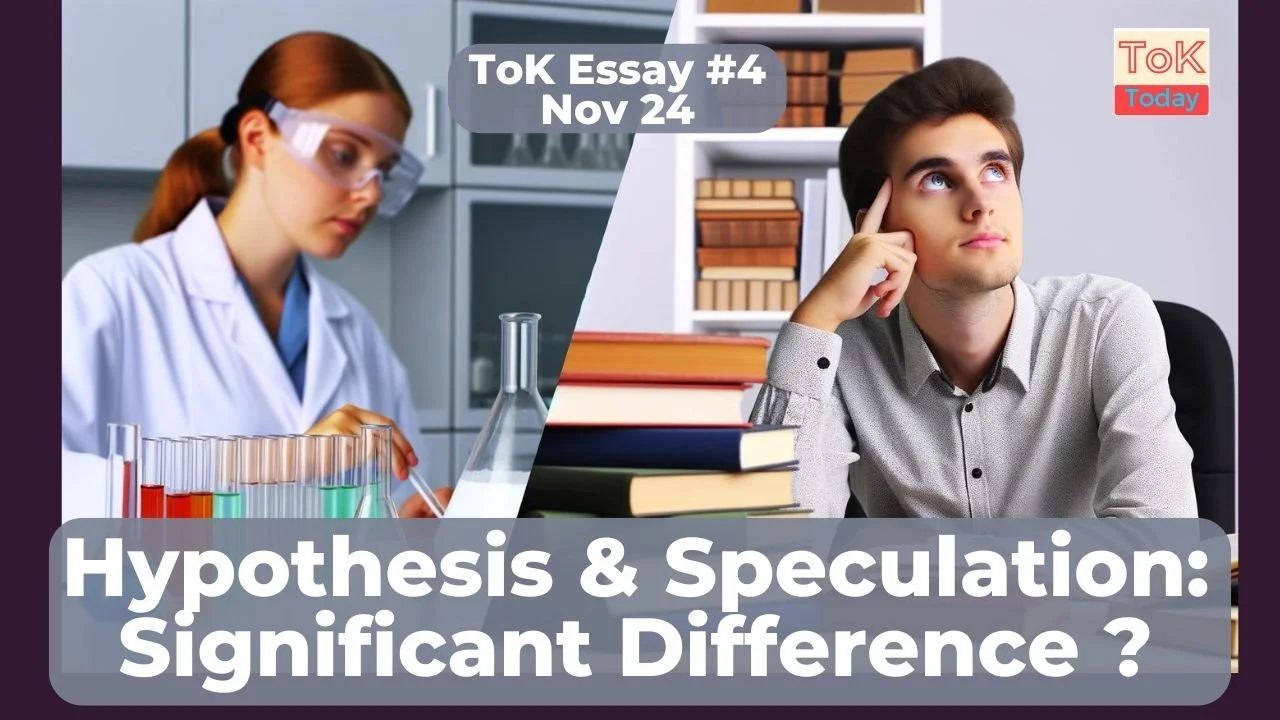ToK Essay #4 N24: Hypothesis & Speculation - a significant difference ?
Is the Difference Between Hypothesis and Speculation Significant?
Today we're looking at ToK Essay #4 N24 "Is the difference between hypothesis and speculation significant?" Understanding the distinction between these terms is essential if you're writing this question. The previous blogpost (linked) focussed on defining the terms, as does the video linked here.
The video for this blog post is linked here, and below.
Defining Hypothesis and Speculation
Developing the definitions for hypothesis and speculation is obviously key to this essay. It is recommended that you develop these definitions within the knowledge arguments that are being used for each okay. This will allow for a more precise and talk focused exploration of these two central concepts.
The Significance of Their Differences
We might wonder, "What's the difference between hypothesis and speculation?" and more importantly, "Is the difference between hypothesis and speculation significant?". We could take the role of evidence as one of our measures of whether difference is significant or not. The role of evidence in the formulation of hypotheses is only one way to measure the significance of difference. There are many other ways, to approach the concept of significance.
Evidence and Knowledge Production
In AoK The Human Sciences, the distinction between hypothesis and speculation could be that hypotheses are formulated from evidence whilst speculation is based on more subjective sources such as experience, or intuition. Hypotheses are typically grounded in evidence, which allows for the development of knowledge that advances our understanding of human cognition and social interactions. For example, research by Bargh and Williams in 2006 on the priming of social distance demonstrates how hypotheses grounded in evidence can reveal insights that speculations could not achieve.
The Criteria for Significance
To evaluate whether the differences are significant, we can consider several factors:
Impact on Knowledge Produced: If the use of speculation leads to different knowledge than the use of a hypothesis, this indicates a significant difference.
Influence on the Subject or Object of Knowledge Production: Changes in who produces the knowledge or how it is produced can also signal significance.
Alterations in Purpose or Intention: If a knowledge producer's intentions vary depending on whether they are speculating or hypothesising, this further underscores a significant difference.
These criteria offer us one (of many) way(s) understand and explore the significance of the differences between hypothesis and speculation.
Evaluating the knowledge argument and its Implications
Questioning the Premises
While it is often argued that hypotheses are grounded in evidence and speculation is not, this distinction may not always hold. The evidence underpinning hypotheses might still be subjective or based on prior assumptions, which could blur the lines between these two forms of reasoning.
The Role of Evidence
The use of a pre-existing evidence base to inform hypotheses tends to reinforce established knowledge. Therefore, one could argue that the significance of evidence in distinguishing between hypothesis and speculation may not be as profound, especially if the aim is to break away from established knowledge paradigms.
Conclusion
To determine if the difference between hypothesis and speculation is significant, one must consider how each affects the production, the nature of the knowledge being produced, the knowledge producer etc. This blog post is just an introduction into the many areas that could be explored using this essay question..
For a a wider, and deeper, exploration of this title pick up the ToKToday Essay Guidance Notes for Essay #4. These include more complex knowledge arguments and real-life examples, at 8,000 words long these notes serve as a mini-textbook focussed solely on this essay title.
Watch the accompanying video on YouTube:




